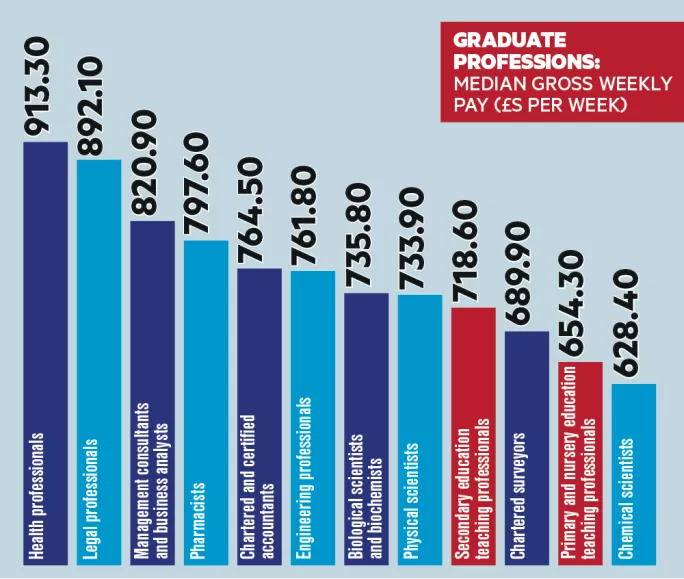Teachers still aren’t being paid the smart money

Teachers have fallen further down the league table of pay for graduate professions in the last decade, according to a new analysis.
The NASUWT teaching union, which commissioned the research, said that increasingly uncompetitive salaries were contributing to a “recruitment and retention crisis”.
The report by Incomes Data Research - exclusively shared with TES - shows that the pay of both secondary and primary teachers has slipped relative to comparable graduate professions since 2005.
In 2005, secondary teachers were ranked sixth out of 12 graduate professions for median gross earnings, while primary and nursery teachers were ranked tenth.
However, by 2015 secondary teachers had fallen to ninth and primary and nursery teachers had dropped to eleventh.
Only chemical scientists - who came at the bottom of the 2015 table - earned less than primary teachers. Secondary teachers earned more than those two groups and finished above chartered surveyors.
But all teachers earned less than physical scientists, biological scientists and biochemists, engineers, accountants, pharmacists, management consultants and business analysts, health professionals, and lawyers.
The relative decline of teachers’ wages means the profession is back in a very similar position to where it was shortly before the turn of the 21st century.
Earnings for teachers compares unfavourably with a range of other graduate occupations
In 1998, secondary teachers were ranked eighth and primary and nursery teachers were at the bottom of the table ranked twelfth.
When looking at average gross earnings, the situation is even worse - in 2015, secondary teachers were ranked tenth and primary and nursery teachers were twelfth.
NASUWT’s analysis will add to fears that inadequate pay is exacerbating teacher shortages.
Ken Mulkearn, the director of Incomes Data Research, said: “Earnings for teachers in England compares unfavourably with those for a range of other graduate occupations.”
He said that this was likely to be a “major contributory factor” to schools’ recruitment and retention troubles.
‘Stark differences’ in pay
Chris Keates, general secretary of NASUWT, said that the “stark differences in graduate pay” would worsen what was already “a recruitment and retention crisis”.
She added: “[Pupils] cannot receive their entitlement to high-quality education when talented teachers are leaving and potential recruits can find jobs in other graduate occupations that recognise and better reward their talents.”
On average, secondary teachers earned 20.2 per cent less in 2015 than the average of all the non-teaching professions in the study.
But primary teachers were even further behind - with their average gross earnings 32.4 per cent lower.
Potential recruits can find jobs in other graduate occupations that better reward their talents
While the pay gap is sizeable for both sets of teachers, it appears to be moving in different directions by phase. Secondary teachers have seen their pay gap narrow compared to other professions between 1998 and 2015.
However, for primary and nursery teachers the gap reduced between 1998 and 2005 but then opened up again between 2005 and 2015.
The research also reveals that new teachers will not see their salaries rise as fast as graduates in other professions as they climb the career ladder.

According to the data, if a teacher gets their progression increases, they can expect to earn 25.5 per cent more than the current minimum on the main pay scale after three years, and 47.6 per cent after five years. But other graduates will see their pay rise by 31.4 per cent on their starting salary after three years, and by 62.3 per cent after five years.
A Department for Education spokesperson said: “The annual average salaries for teachers in the UK are greater than the OECD average, and higher than many of Europe’s high-performing education systems like Finland, Norway or Sweden.
“We have also given schools unprecedented freedoms over staff pay so they can attract the best teachers.”
You need a Tes subscription to read this article
Subscribe now to read this article and get other subscriber-only content:
- Unlimited access to all Tes magazine content
- Exclusive subscriber-only stories
- Award-winning email newsletters
Already a subscriber? Log in
You need a subscription to read this article
Subscribe now to read this article and get other subscriber-only content, including:
- Unlimited access to all Tes magazine content
- Exclusive subscriber-only stories
- Award-winning email newsletters